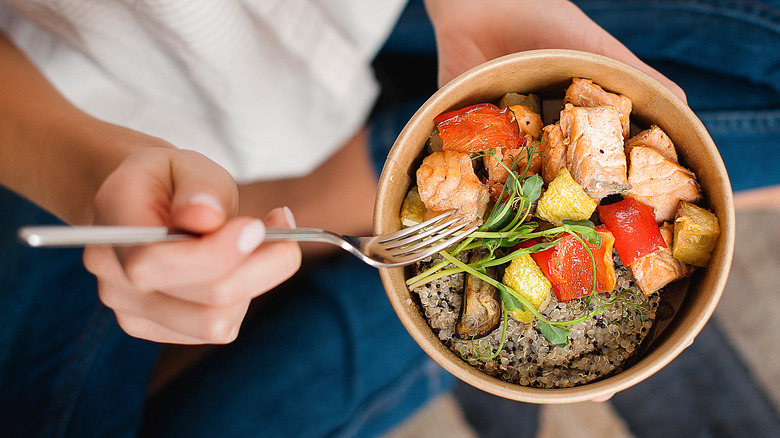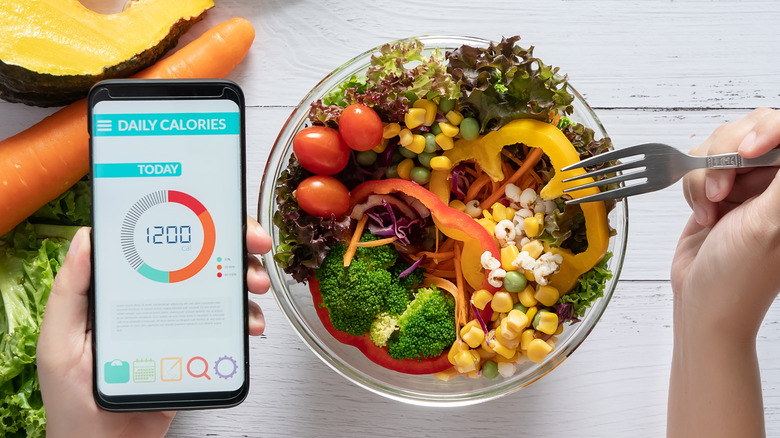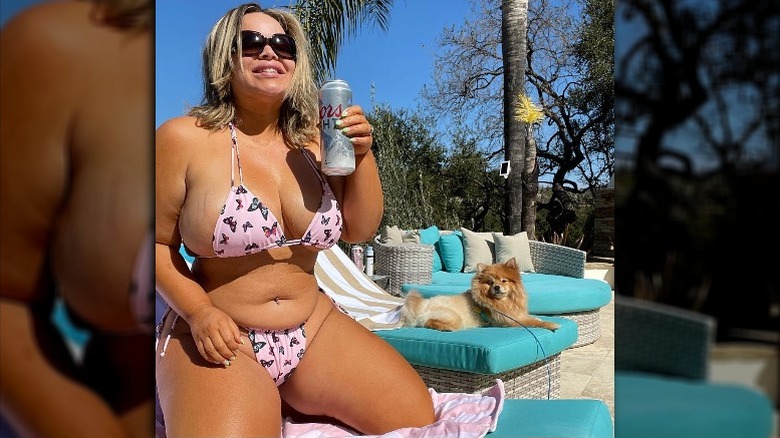Why TikTok 'What I Eat In A Day' Videos Are So Concerning
Models, musicians, and influencers of all niches have taken it upon themselves to show the world their peculiarly similar dinner plates. "What I Eat in a Day" videos are ever-present streams of avocado toasts, açaí bowls and goji berry infusions, as influencers take us through the details of their daily diet.
The vlog-style videos offer friendly meal inspiration to their viewers and often have "Healthy" or "Simple" in their titles. However, they also come with idealized body types in the thumbnails and aspirational "clean eating" habits that may not be as healthy as we'd think. "Many of these videos are promoting diet culture and disordered eating behaviors. When watching these videos, people may feel self-conscious and anxious about what they eat in a day, compared to these curated videos," Chelsea Kronengold, the communications manager for the National Eating Disorders Association, tells Healthline.
While these videos are a reliable content category on YouTube, the hashtag "WhatIEatInADay" has made its way to TikTok, garnering over 7.3 billion views.
If you are struggling with an eating disorder, or know someone who is, help is available. Visit the National Eating Disorders Association website or contact NEDA's Live Helpline at 1-800-931-2237. You can also receive 24/7 Crisis Support via text (send NEDA to 741-741).
What I Eat in a Day videos are viral on TikTok
Glimpsing into your favorite fitness influencers' lives may seem like a harmless addition to your scrolling routine, but experts on nutrition and mental health think otherwise. Allison Chase, a psychologist based in Texas tells Healthline, "The viewer could think, 'Well, if this girl has the body I want, and this is what she's eating, then if I eat what she eats in a day, I'll look like that, too,'" Chase explains. "But that's not a healthy or realistic way to achieve what is likely a very unrealistic goal. What fits the needs of one body does not fit the needs of another. Our bodies are complex machines, so to speak, and it is essential we recognize what is needed for our own health and well-being."
TikTok is notoriously known to be an app for younger audiences — the hashtag "TooOldForTikTok" has 127 million views, and Statista's analysis confirms that 47.4% of TikTok's U.S. audience is between the ages of 10 and 29. Considering teens are more susceptible to eating disorders (via National Library of Medicine), this kind of content can be triggering for many. Influencers like Sarah Stevenson from "Sarah's Day" on YouTube have come under criticism for promoting disordered eating through obsessive workout challenges and diets (via Thought Catalog). TikTok's algorithm also bestows celebrity status to almost anybody with the right hashtag (via Later), which makes it easier to find nutrition advice from someone who isn't certified.
Diet videos are getting more realistic on TikTok
"When it comes to weight loss, people often look for the quickest way. Social media has made it easier now than ever before to get nutrition advice but, unfortunately, that advice is not always accurate," registered dietitian Leah Forristall tells Healthline. Some dietitians like Abbey Sharp have taken to YouTube to analyze and review influencer diets for their audiences.
However, many TikTokers are catching onto the fact these videos are basically repackaged diet cultures that boldly sidestep body diversity."This is so problematic, because the vast majority of the time, the videos are being done by thin, able-bodied, younger white women — women with an immense amount of body privilege," Colleen Reichmann, a Philadelphia-based clinical psychologist, tells Health.
Digital creators like Trisha Paytas began posting videos of "realistic" days of eating — as real as it can get on social media, anyway. Other video creators followed suit, and captions like "what I eat in a day as a chubby person who doesn't want to lose weight" or "what I eat in a day in ED recovery" began to gain traction. These videos feature carbs in all their glory and promote nothing but feeling good in one's body.
As a verdict: do your research, eat your carbs and avoid the "What I Eat in a Day" binge-watch.


